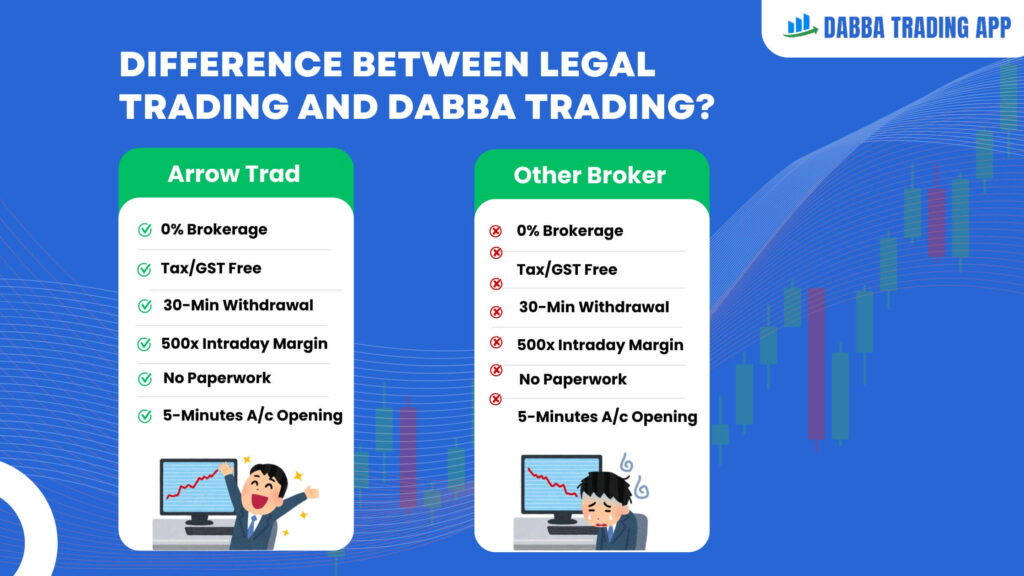When it comes to investing, it’s important to understand the difference between a legitimate business and a bottle business. Both strategies involve buying and selling securities, but operate on very different structures with specific risks and returns. This guide will help you understand these differences and why choosing a law firm is a wise choice for your financial journey.

Legal Trade
- Rules and the obvious: Legal Trading is done through government-recognized stock exchanges, such as the Bombay Stock Exchange (BSE) or the National Stock Exchange (NSE) in India. These exchanges are regulated by the Securities and Exchange Board of India (SEBI), which ensures transparency, fairness and protection of investors. All tasks are documented and monitored, creating a safe working environment.
- Bank security: Legal trading offers a wide range of safeguards to protect investors. This includes the Investor Protection Fund (IPF) which provides investors with claims in the event of broker default. Additionally, all transactions are resolved through a management company, reducing the risk of default.
- Access to real-time information: In legal trading, investors have access to real-time market information and analysis. This transparent information helps inform informed decision making, reducing the risk of injury due to misinformation or lack of information.
- Demat Notes: In legal transactions, securities are held in dematerialized form (Demat) in accounts. This electronic format eliminates the risks associated with physical credentials such as theft, loss, or destruction. This also simplifies the process of buying, selling and distributing shares.
- Legal Action: In case of any dispute, investors get legal recourse through SEBI or Consumer Court. This compliance ensures that any complaints are dealt with promptly and fairly.
Dabba Trading
- Lack of Regulation: Dabba trading operates outside the purview of official stock exchanges and regulatory bodies. Transactions are conducted privately between the investor and a Dabba operator, who records the trades in their own books instead of the official exchange.
- High Risk of Fraud: Since Dabba trading is unregulated, there is a significant risk of fraud. Dabba operators can manipulate prices, indulge in unfair practices, or even abscond with investors’ money. There is no regulatory body to oversee their actions or offer protection to the investors.
- No Investor Protection: In Dabba trading, there is no protection similar to the Investor Protection Fund. If the operator defaults or shuts down, investors have little to no recourse to recover their funds. This makes Dabba trading highly risky compared to legal trading.
- No Access to Real-Time Market Data: Dabba trading often relies on delayed or inaccurate market data. Investors may not have access to real-time information, which can lead to poor decision-making and significant financial losses.
- Non-existent Demat Account: In can trading, securities are not held in demat accounts. Instead, the operator manually records it on tape, increasing the risk of discrepancies and fraudulent activity.
- There is no legal way: When disputes arise in the bottle industry, investors have little or no legal recourse. Because these services do not follow the federal legal system, seeking justice can be difficult and often futile.
Why choose Legal Trading?
Legal trading provides security, transparency and regulation that protects your investments and provides peace of mind. When you trade through a recognized brokerage and store security in a Demat Account, you benefit from legal protection, access to real-time information, and the ability to legally resolve disputes
Choosing the profession of a lawyer not only minimizes the risks but also opens the door to many financial opportunities. Consider opening a Demat account with a reputable merchant to start your journey safely and regularly. This will keep your investment safe, transparent and secure, which will keep you on the path to achieving your financial goals.
Invest smartly, trade legally, and secure your financial future by opening a Demat Account Today.
FAQ: Legal Trading vs. Dabba Trading
What is Legal Trading?
Legal trading occurs through official stock exchanges like BSE and NSE, regulated by SEBI. It ensures transparency, investor protection, and real-time data access.
What is Dabba Trading?
Dabba trading is an illegal practice where trades are conducted outside official exchanges by Dabba operators, lacking regulation and investor protection.
How are They Regulated?
- Legal Trading: SEBI-regulated, with transparency, protection funds, and legal recourse.
- Dabba Trading: Unregulated, high fraud risk, no investor protection, no legal recourse.
What are the Risks of Dabba Trading?
- High fraud risk
- No investor protection
- Inaccurate market data
- No secure Demat accounts
- No legal recourse
Why is Legal Trading safer?
- Transparency: Real-time data
- Security: Monitored transactions
- Protection: Investor funds, legal recourse
- Demat Accounts: Secure, electronic holding
What is a Demat Account?
A Demat account securely holds securities electronically, simplifying transactions.
Can I trade commodities in both?
- Legal Trading: Yes, via regulated platforms like MCX.
- Dabba Trading: Yes, but with higher risks due to no regulation.
How can I start legal trading App?
- Open a Demat account with a reputable broker.
- Trade on recognized exchanges like BSE/NSE.
- Use real-time data for decisions.
- Follow SEBI regulations.
Why open a Demat account?
- Security: Safe electronic storage
- Convenience: Easy transactions
- Transparency: Real-time data
- Regulation: SEBI compliance
Invest wisely, trade legally. Open a Demat account today with a trusted broker.

